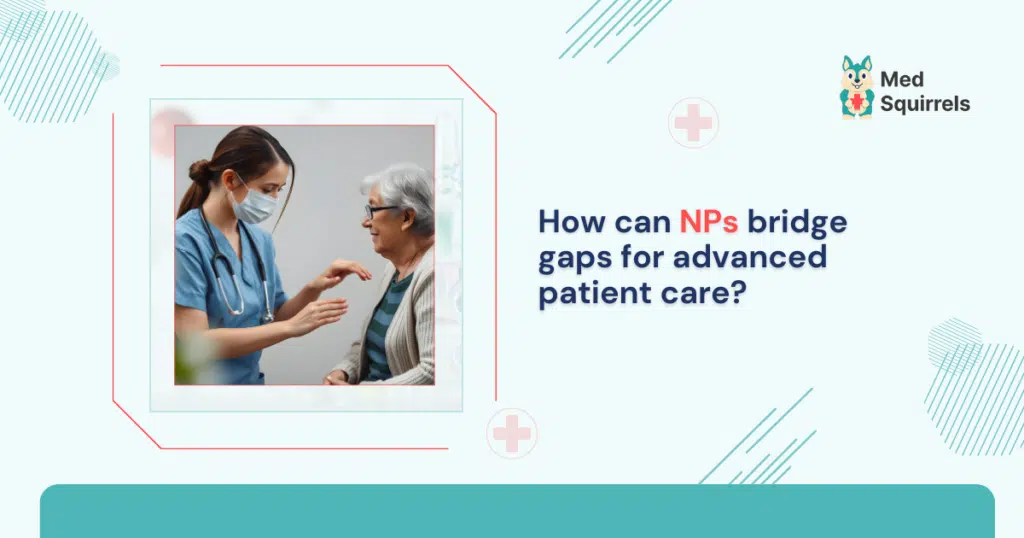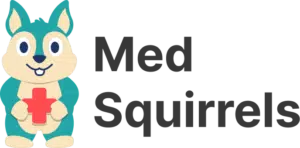How can NPs bridge gaps for advanced patient care

Nursing practitioners or NP work in association with other nursing staff and medical teams, such as physicians, social workers, pharmacists, etc, to provide interdisciplinary patient care. They are also known as Advanced Practice Registered Nurses (APRNs) and have a master’s degree in nursing to provide special care to patients. Furthermore, they supervise Nursing Assistants and LPNs or LVNs to provide optimized patient care. Even though the scope of practice in most states specifies that nurse practitioners should work alongside physicians, some states permit nurse practitioners to work independently. This helps nurse practitioners bridge the gap between nursing and medical teams to provide advanced patient care in critical scenarios.
Can NPs be a part of the solution to physician shortage?
With advanced skills for providing optimized patient care, such as diagnosing and managing diseases, prescribing medications, and supervising other allied health professionals, hiring nurse practitioners can be a great solution to the physician shortage in your healthcare facility. In many states, nurse practitioners can work independently as primary care providers, which aids in resolving the physician shortage, especially in underserved areas, without compromising the quality of care. However, the healthcare facility needs to be aware of the scope of practice of the nurse practitioners in the state where your facility is located to understand whether the nurse practitioners are entitled to “full practice” status or have to work in collaboration with the physicians. It is essential to stay compliant with regulatory considerations when utilizing nurse practitioners as a solution to the physician shortage. Given below are some tips for healthcare facilities to leverage nurse practitioners as an alternative to physicians.
- Evaluate the patient population in your facility and understand whether there is a need to hire nurse practitioners with a specialization in a particular domain.
- Ensure that nurse practitioners undergo continuous education to enhance their skill sets and stay updated to deliver advanced patient care.
- Encourage a collaborative care model in which NPs, physicians, pharmacists, and other allied health professionals collaborate to provide comprehensive care.
- Foster a supportive work environment to improve nurse-practitioner collaboration with other allied health professionals to increase patient satisfaction.
The evolving role of nurse practitioners in leadership and decision-making
The demand for nurse practitioners in the healthcare sector is very high, with the US Bureau of Labor Statistics projecting 46% employment growth in the upcoming decade, with 292,500 nurse professionals in the USA as of 2023. The benefits of nurse practitioners in healthcare facilities include providing a team-based care model. NPs are associated with nursing staff, physicians, pharmacists, social workers, and other allied health professionals aiding in advanced patient care. With their advanced skillsets, education, clinical expertise, and organizational skills, nurse practitioners are evolving to take up NP leadership roles within healthcare facilities. NPs supervise nurse assistants, registered nurses, and LPNs, allocate duties to them, and together, advocate for expanding the access of healthcare to all sections of society. With a skilled nurse practitioner, healthcare facilities can streamline most of the hurdles faced within the nursing department and navigate the nursing shortages. By supervising the nursing teams and providing mentorship to the newly recruited nursing professionals in the team, nurse practitioners lead the workforce in providing optimized patient care.
Nurse Practitioner workforce over time

Source:Data USA.io
How NPs enhance communication and contribute to cost-effective healthcare delivery
Being the primary care provider for patients, NPs establish a strong relationship with the patient by understanding the medical condition of the individual, their case history, lifestyle, and associated illnesses. This helps NPs enhance health literacy among patients and their families to aid in preventive care for major chronic illnesses. Most hospital admissions can be prevented by the early intervention of the disease and taking preventive measures to manage the illness. Thus, by aiding patients in making informed decisions about their health conditions, nurse practitioners contribute to cost-effective healthcare solutions. In areas where there is a shortage of physicians, NPs can greatly help to fill the gap and provide timely care to patients in case of emergencies. Moreover, by fostering team dynamics, NPs help healthcare facilities implement an effective patient-centered care approach that can help facilities build long-term relationships with patients.
Challenges associated with hiring NPs
- The difference in the NP scope of practice in various states makes it challenging for nurse practitioners as they are required to have a supervisory agreement from a physician.
- The hiring and retention of nurse practitioners are becoming challenging due to the increased demand for nurse practitioners in the USA.
- Miscommunication of the NP duties and roles in the job description can create confusion among potential applicants.
- The license regulations and compliance process associated with NP hiring are complex and, when not followed, can lead to severe penalties.
- There is a shortage of qualified nurse practitioners, especially in underserved communities and rural locations.
- The increase in NP turnover rate due to the high work stress and burnout is another challenge that hinders the long-term retention of skilled NPs in healthcare facilities.
- Another important challenge is the complexity of the credentialing process. As the primary care providers to the patients, a nurse practitioner with a criminal background can put the lives of patients at risk. Hence, the credentialing process associated with hiring a nurse practitioner is complicated.
- Unfair compensation structures below the market standards, which can be caused due to the huge markup fees levied by the NP staffing agencies can affect the long-term hiring of nurse practitioners.
How MedSquirrels can help you overcome NP hiring challenges
MedSquirrels is a healthcare staffing solutions platform revolutionizing the healthcare sector with the help of technology. Incorporating AI, MedSquirrels has an automated process that helps streamline the steps associated with hiring nurse practitioners. MedSquirrels can take care of all your staffing and payroll needs, from crafting job descriptions and interviewing to onboarding and payroll of contract and full-time nurse practitioners based on your job requirements. In addition, our platform can handle the payroll of your hired nurse practitioners. You can leverage our hiring plans to fulfill your NP hiring needs. For example, for recruitment and payrolling of contract nurse practitioners, you can choose the Orange plan, and for the onboarding and payrolling of your already-sourced contract nurse practitioners, you may proceed with the Purple plan.
The most promising feature of our staffing and payrolling platform is that it works on a flat-fee model, which means all of the NP hiring solutions have zero markup fees. MedSquirrels does not charge any huge markup fees like traditional staffing agencies. Instead, it charges only a flat fee along with the payroll cost of the nurse practitioners hired through us. This benefits healthcare facilities by allowing them to hire top talent without overspending while fostering long-term retention of the talent. It also benefits the NP talent by enabling them to earn above industry standards. Book a demo today to learn more about MedSquirrels.
FAQs
How long does the NP hiring process typically take?
Hiring an NP via a traditional staffing agency can take several weeks to months, depending on the availability of suitable candidates and the complexity of the hiring process. Utilizing a large network of pre-vetted candidates can help expedite this timeline, which can attained by associating with a staffing platform like MedSquirrels.
What are the common challenges in hiring a nurse practitioner?
Common challenges include a shortage of qualified nurse practitioners, lengthy hiring processes, and high competition for talent. These issues can be addressed by implementing a streamlined hiring process and accessing a vast network of professionals.
How can a staffing platform help address challenges in hiring NPs, and how does it benefit a facility?
Signing up with a staffing platform will help solve problems with hiring NPs and benefit your facility in terms of offering solutions to shortages of qualified candidates and costly recruitment due to high markups charged by most traditional staffing agencies. A staffing platform will help your facility hire NPs more efficiently to maintain continuous quality patient care.
What are the various NP hiring plans available at MedSquirrels?
MedSquirrels offers various plans, including the Orange Plan, which handles contract recruitment and payroll while ensuring hiring process transparency and cost-effectiveness. The Purple Plan will onboard contractors already sourced by you and will handle their payroll and benefits administration.
Suresh writes about healthcare staffing and industry insights for MedSquirrels, helping professionals and facilities navigate hiring needs.
